How the Russian Billionaires Provide Mercenaries to the Russian Army
Oleg Deripaska, Leonid Mikhelson, Gennady Timchenko, and other businessmen recruit volunteers for the war on salaries. In the meantime, their businesses, which is involved in this — Rusal, Novatek, PIK, Mospromstroy — successfully avoid sanctions
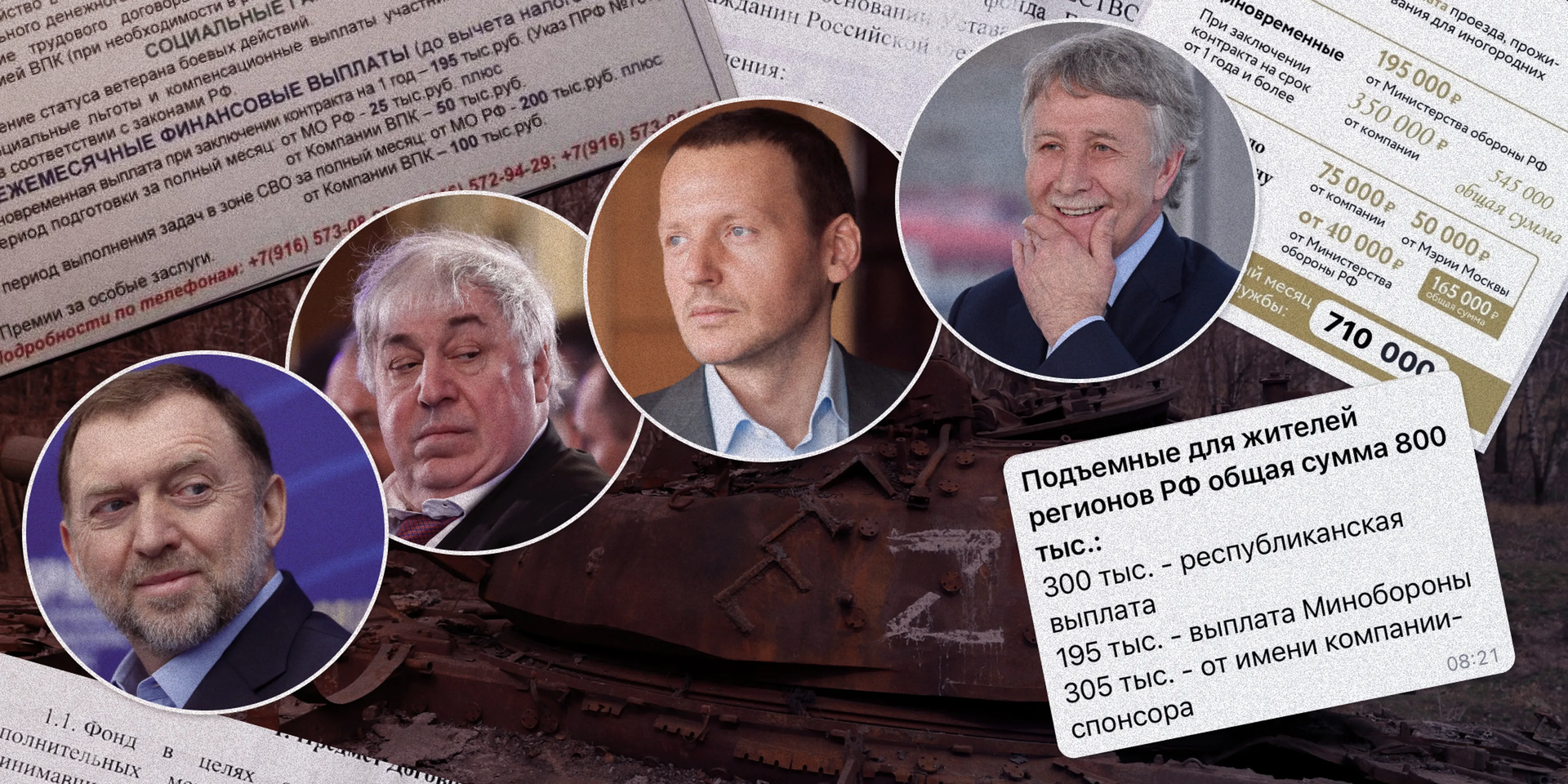
The mercenaries from Deripaska
Igor Sergienko with the call sign Shershen came to fight in Ukraine as a Wagner Group mercenary back in 2014: “They called us ‘they’re-not-there’ back then,” he recalls in a conversation with IStories. Then he was in Syria — “participated in the capture of Palmyra,” and in 2022 returned to Ukraine, first as part of the private military company (PMC) Redut, and now as a platoon commander in the Sokol battalion.
Sokol is a volunteer battalion, but like most PMCs, it is part of the Russian armed forces (belongs to the 108th Guards Air Assault Regiment). Therefore, Sergienko’s salary comes from two sources: 200 thousand rubles a month under the contract is paid by the Ministry of Defense, and another 100 thousand — by the sponsor (“military–industrial complex company”, as it says in the advertisement).
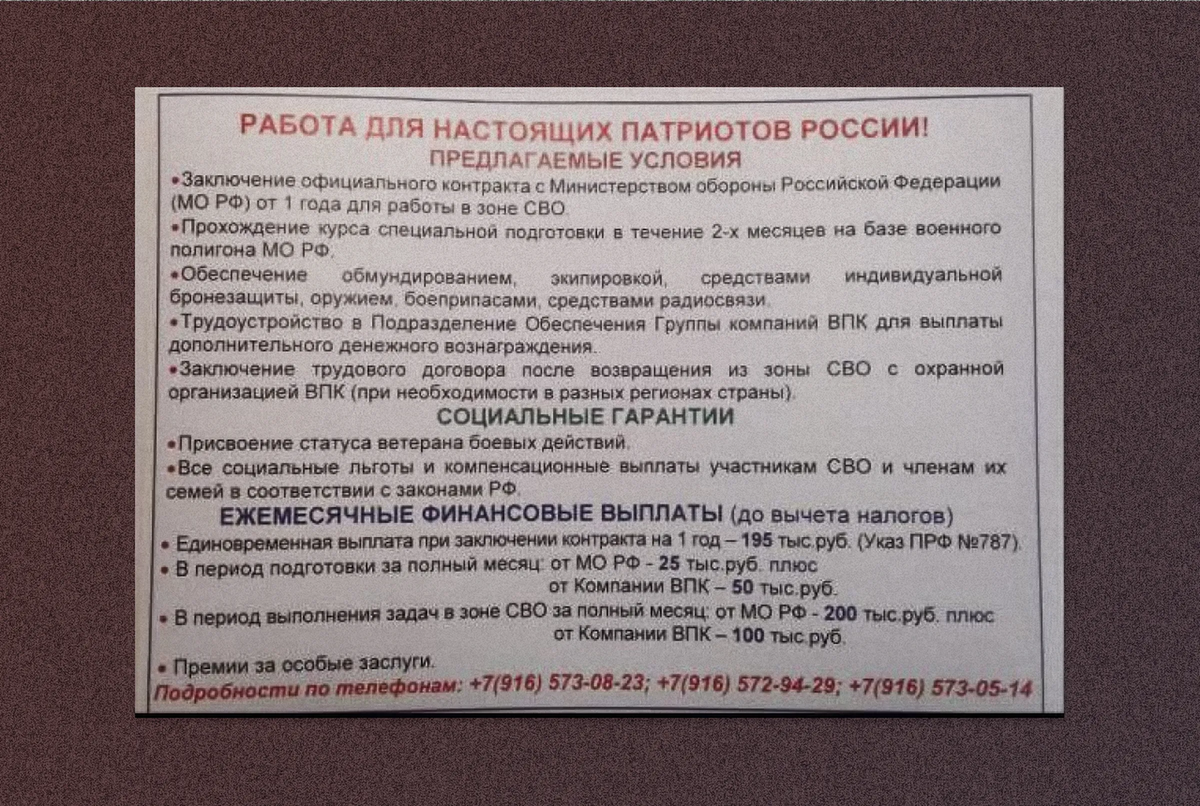
“We first employ a person [in our company] the day before the contract [with the Ministry of Defense] is signed, and then we suspend the employment contract, and we have a reason to pay bonuses to our employee who went to the SMO [special military operation — it’s how Russian officials call the war]. Such a scheme,” said a recruiter who called himself Viktor Fedorovich (IStories journalist introduced as a recruit). Shershen does not remember what kind of sponsor it is, from which, as he put it, “additional capital investments” are coming, and Victor Fedorovich does not say.
The phone numbers that Sokol lists in its Telegram for those wishing to sign up for the war belong to Rusal Management. It is a 100% subsidiary of Rusal, one of the largest companies in Russia and one of the largest aluminum producers in the world, and its main owner is billionaire Oleg Deripaska. Rusal Management, to whose phones the calls from volunteers go, manages Rusal (we could say, it is its CEO). The number that Victor Fedorovich gave to the IStories “recruit” to solve issues on further employment is also assigned to it.
In fact, it's not even a secret to their own people that mercenaries are employed by Deripaska’s company. They discuss it in chat rooms: for example, a Sokol volunteer with the call sign Kiev wrote that “Deripaska is organizing Sokol personnel into his PSCs [private security companies].”
IStories found a confirmation of this scheme.
Thus, Igor “Shershen” Sergienko has been working for Ruslan private security company since October 2022 — which is when, according to him, he joined Sokol. Ruslan’s bank statement, which was analyzed by IStories, explicitly states that the company employs mercenaries: “Gratuitous payment of funds to a person performing military service under a contract” is the purpose of the payment opposite a number of names, including Sergienko.
Ruslan PSC is strongly linked to Deripaska — last year two companies affiliated with the businessman were his only clients, from which he received about 90 million rubles.
Ruslan had two clients in 2022: Glavstroy-SPB Specialized Developer paid almost 80 million rubles, and Impulse paid about 12 million rubles.
Glavstroy-SPB is one of the largest real estate developers in St. Petersburg, since the mid-2000s the company was part of Oleg Deripaska’s holding, until the businessman was sanctioned in 2018. After that, the ownership structure of Deripaska’s assets began to change and in 2021 (the latest publicly available data) the final owner of 91% of Glavstroy SPB is listed as Fenestraria Consultants Limited, registered in Kaliningrad. As Minister of Economy Maxim Oreshkin claimed, this company is related to Deripaska (Deripaska’s representative denied this, and one can guess why).
Impulse belongs to the large agricultural producer Rassvet from Ust-Labinsk district, Deripaska’s homeland. In 2020 (the latest publicly available data), its ultimate owner was Valentina Deripaska, who is described as the businessman’s mother.
Scrolling through Sokol’s chats, IStories found at least two more mercenaries employed by Deripaska. One is Alexei Kupriyev, call sign Kapa, who introduces himself on Telegram as the commander of the Sokol-2 battalion. Kapa has also been fighting since 2014, here’s a video of him talking about it. The other is Vladislav Olenich.
Kupriev and Olenich are employed by the Krasnodar-based company Aeroterminal, which builds and renovates airports in Krasnodar, Anapa and Krasnoyarsk. The company is 70% owned by Aerodynamika, a company founded by Oleg Deripaska (it was called Basel Aero before sanctions were imposed on the businessman). Aerodynamika manages airports in Sochi, Krasnodar and Anapa. Kupriev and Olenich refused to talk to IStories.
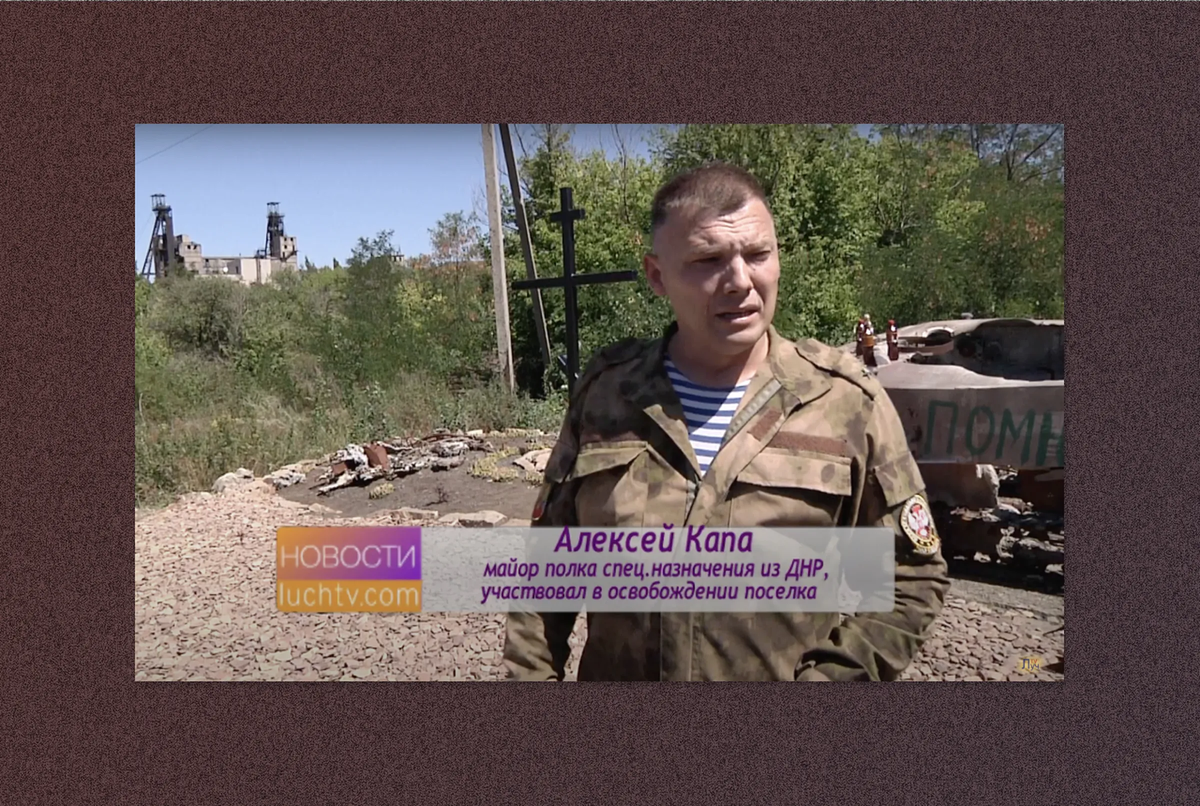
Deripaska himself, as already mentioned, is under sanctions. But Rusal, whose managers are now recruiting mercenaries for the war with Ukraine, was exempted from sanctions after Deripaska reduced his stake in the company below controlling interest. In July, European Aluminium, the European aluminum industry association, said in a memorandum that sanctions against Rusal should be avoided because it is highly integrated into the global economy.
Rusal told IStories that the company has nothing to do with the activities of volunteer structures and knows nothing about the use of its phone numbers by outside organizations.
The security guards from Mikhelson and Timchenko
The family of Igor Kozhushko, a native of Yamal, did not know that he was going to Ukraine — he had already called them from the training center in Murmansk. That was on September 28 last year; already on November 4, a stranger wrote to his sister that Kozhushko had died in the war.
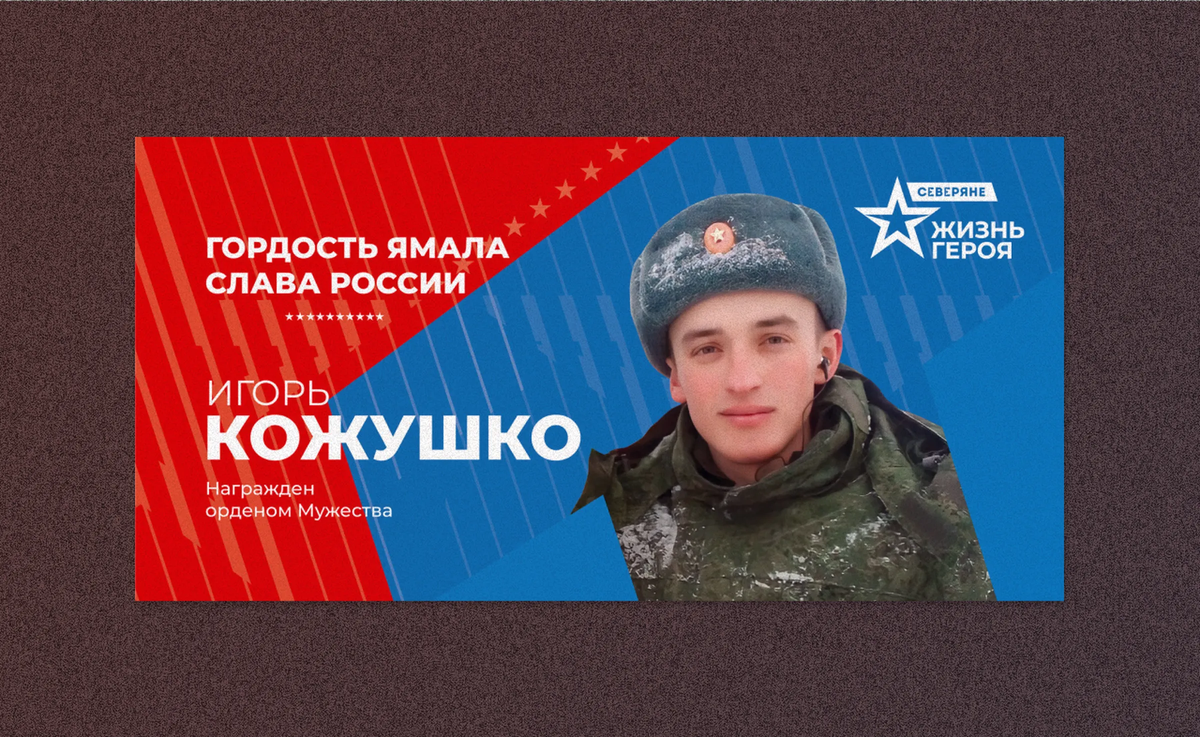
The family managed to find out that Kozhushko went to war together with Novatek employees. He joined the 7th Company of the infamous 200th Separate Motor Rifle Brigade, which, according to The Washington Post, had lost half a thousand men in just three months since the start of the war. Having lost so many soldiers, the brigade was in dire need of new recruits. Some of them were volunteers from Novatek.
This company is Russia’s second largest natural gas producer after Gazprom. Its main owners are billionaires Leonid Mikhelson and Vladimir Putin’s friend Gennady Timchenko, both of whom are under sanctions. Sanctions affected Novatek only partially — the U.S. authorities imposed a ban on any financing of the company for more than 14 days (which caused difficulties with the financing of the project Yamal LNG). However, in 2022, Novatek only increased its liquefied gas supplies to Europe and, according to Reuters calculations, may soon overtake Gazprom in this indicator.
Novatek treats mercenaries like Rusal. One of the volunteers shared the phone number of his Novatek recruiter with IStories. The number belongs to Andrei Vasilyev, the general director of the Saturn-1 PSC. This PSC was founded by Novatek. Although now it does not formally belong to it, its business is fully dependent on Leonid Mikhelson: in 2022 and early 2023, the PSC received almost all of its revenue — almost a billion rubles — from Mikhelson’s structures, including from the trendy Moscow cultural center GES-2.
When IStories’ journalist, introducing himself as a volunteer, asked Andrei Vasiliev if it was possible to “get a job through Novatek”, he answered in the affirmative. And also clarified that the payments go through the Muzhestvo fund: 200,000 rubles a month in addition to payments from the Ministry of Defense.
There is only one charity fund with this name in Russia, it was registered in September 2022. Almost all donations that the fund received in the first three months of its existence came from Novatek — more than 200 million rubles.
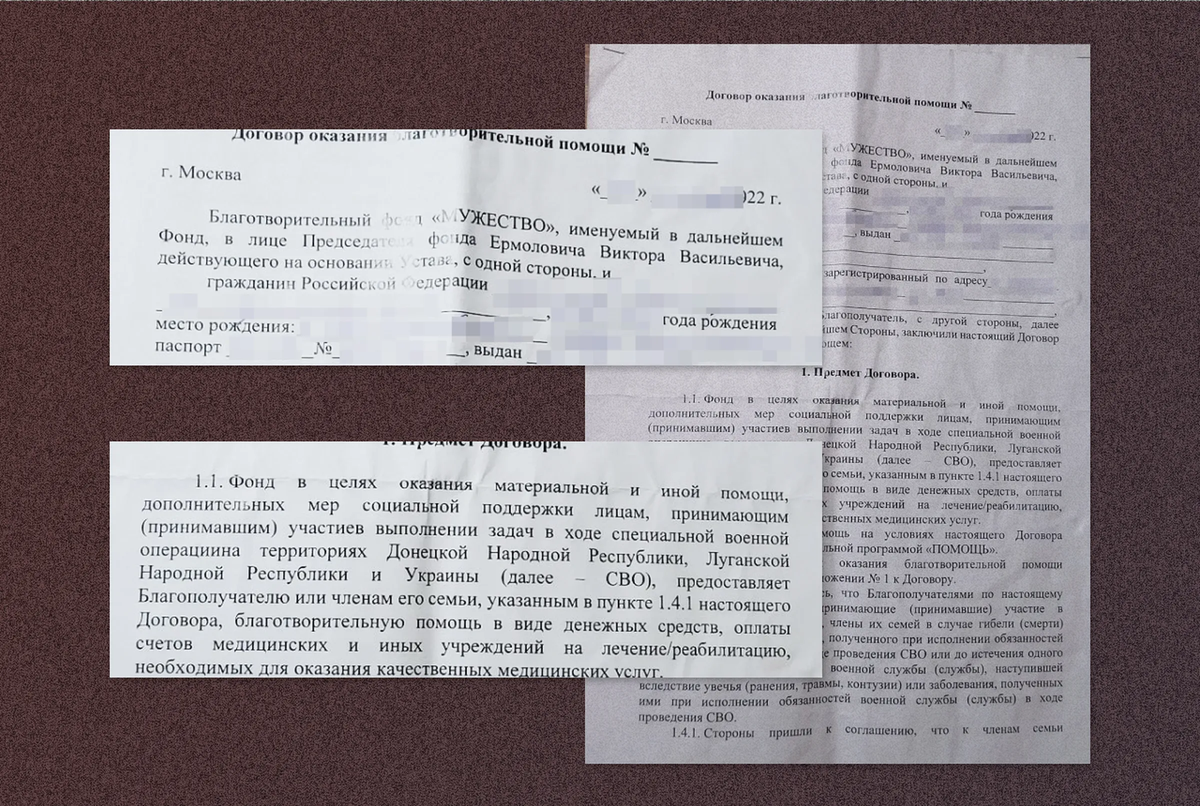
IStories analyzed the financial documents, which show that the deceased Igor Kozhushko worked (really worked, not just listed) in the Bastion private security company owned by Saturn, which protects Novatek’s fields. And he received payments for his military service from the Muzhestvo fund as a charitable aid.
Kozhushko’s colleague at Bastion, who also went to war, praises Muzhestvo because it pays well: 300,000 rubles a month on top of his 200,000 rubles salary from the Ministry of Defense. According to him, his colleagues-guards were recruited right at their workplace — on shift, by representatives of Novatek and Bastion. He himself was on vacation at the time — later he and other vacationers were invited to come to Moscow “for a conversation.” “No one knew what it was about. But they said the turnout should be one hundred percent.” At the “conversation” the guards were offered to go to war.
Novatek did not answer the IStories’ questions, and neither did the general director of Saturn Andrei Vasiliev.
The builders from Gordeev and Gutseriev
“The largest federal company invites volunteers as part of its support for military service under contract” — this was the announcement on Russian classified advertisements website Avito by a company Inzhteploprogress. The conditions are about the same as everywhere else: 400,000 rubles as starting money, then 100,000 rubles a month from the company and 200,000 rubles from the Ministry of Defense.
Inzhteploprogress itself does not in any way qualify as “the largest federal company,” but its co-owner, Russia’s largest real estate developer PIK Group, which is owned by billionaire Sergey Gordeev, fits this definition quite well.
Another PIK Group company, General Contractor — MFS, also published such ads. In addition, it was looking for an “agent for recruiting volunteers for the contract”. Salary — 15 thousand rubles “per candidate.” IStories called to apply for this vacancy, but too late: the employee has already been found.
PIK Group did not answer the IStories’ questions.
PIK is not the only real estate developer that needs soldiers of fortune. “A contract serviceman to the SMO zone” is the kind of employee that businessman Mikhail Gutseriev's Mospromstroy is looking for. Mospromstroy is smaller than PIK, but older and more prestigious: built the Cathedral of Christ the Savior, reconstructed the famous Moscow museums and theaters, the company's motto — “We create the silhouette of Moscow.” Mospromstroy’s starting money for mercenaries is less than PIK’s — only 200,000 rubles, but their salaries are bigger — 150,000 rubles (in addition to the Ministry of Defense payments, of course). The company did not answer the questions posed by IStories.
The motherland getting more expensive
Russia is ready to pay mercenaries more and more. For example, Yakutia already offers 800,000 rubles as starting money for recruits: 300 thousand from the sponsoring company, 300 thousand from the region and 200 thousand from the Ministry of Defense.
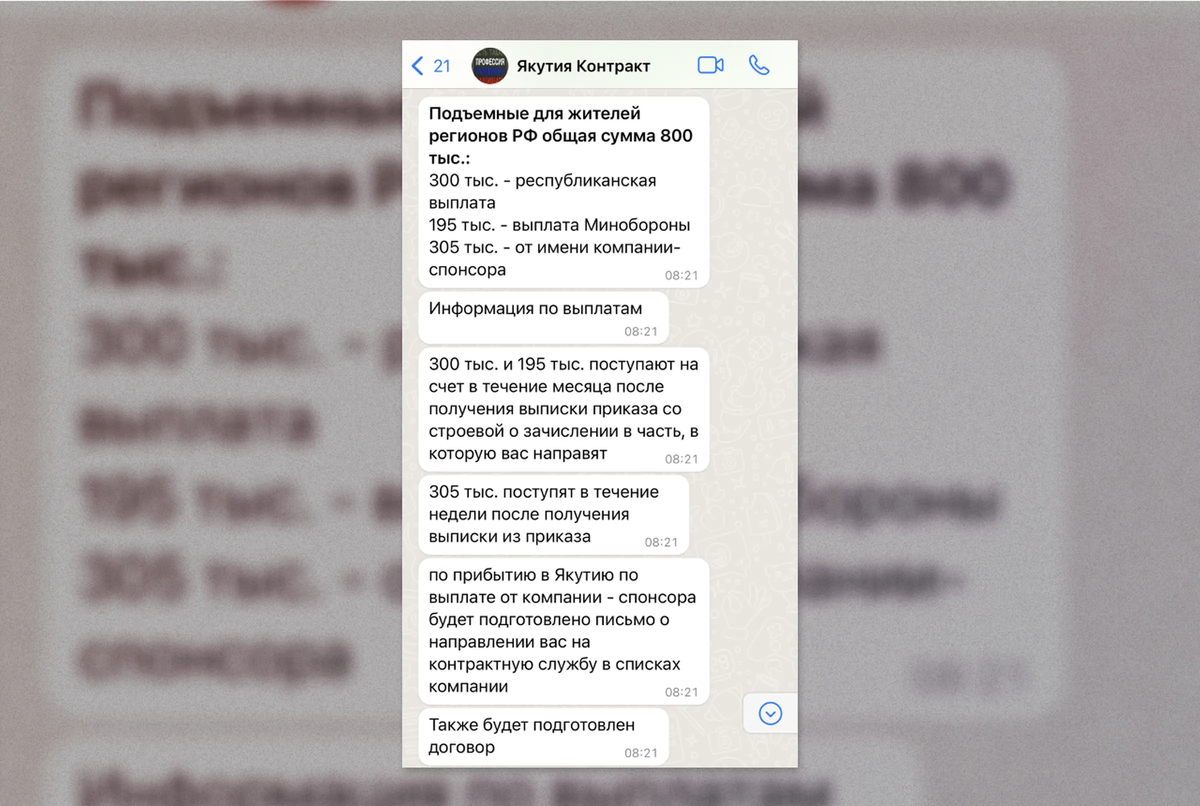
Ekaterinburg-based engineering company Mashprom raised the rates from 560,000 to 710,000 rubles.
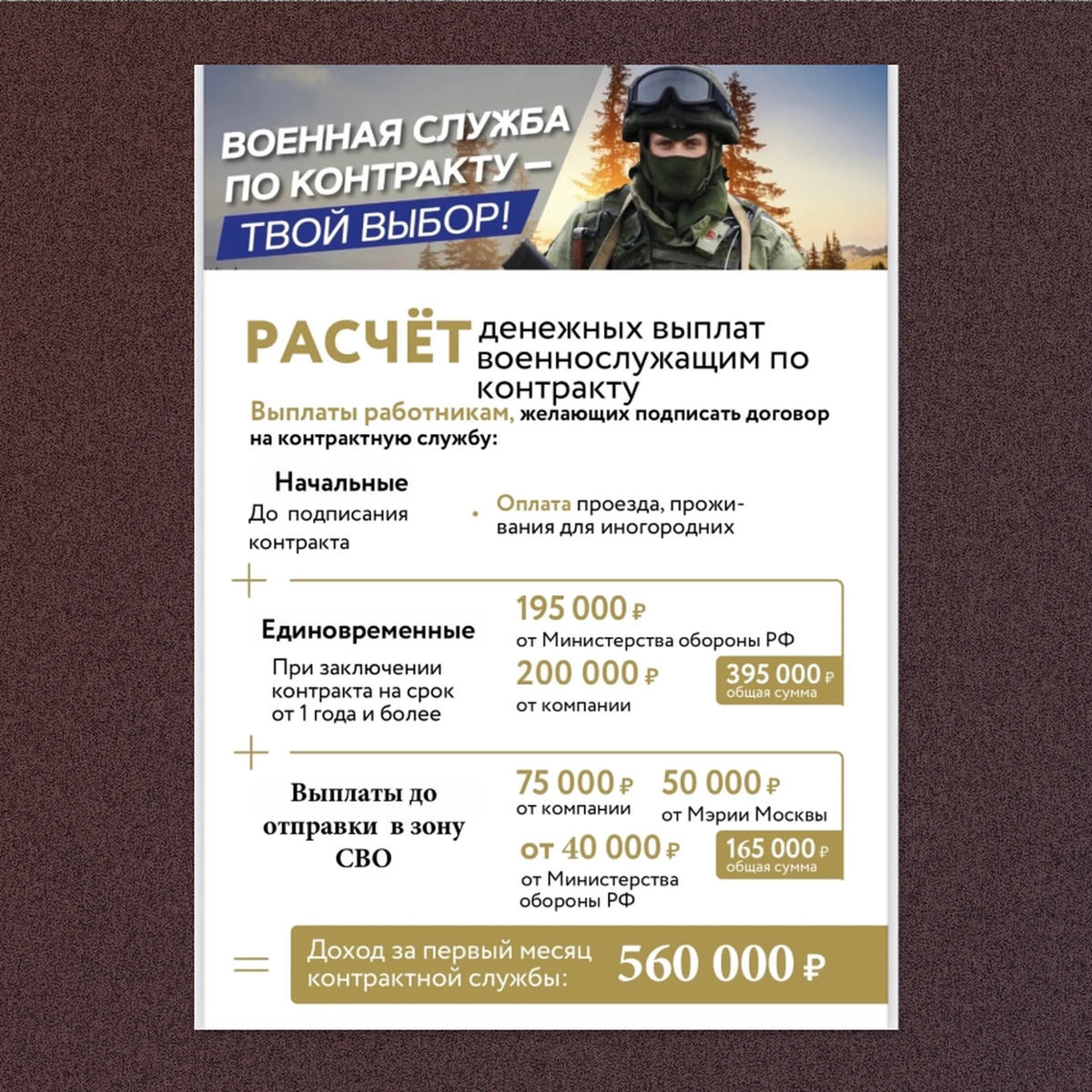
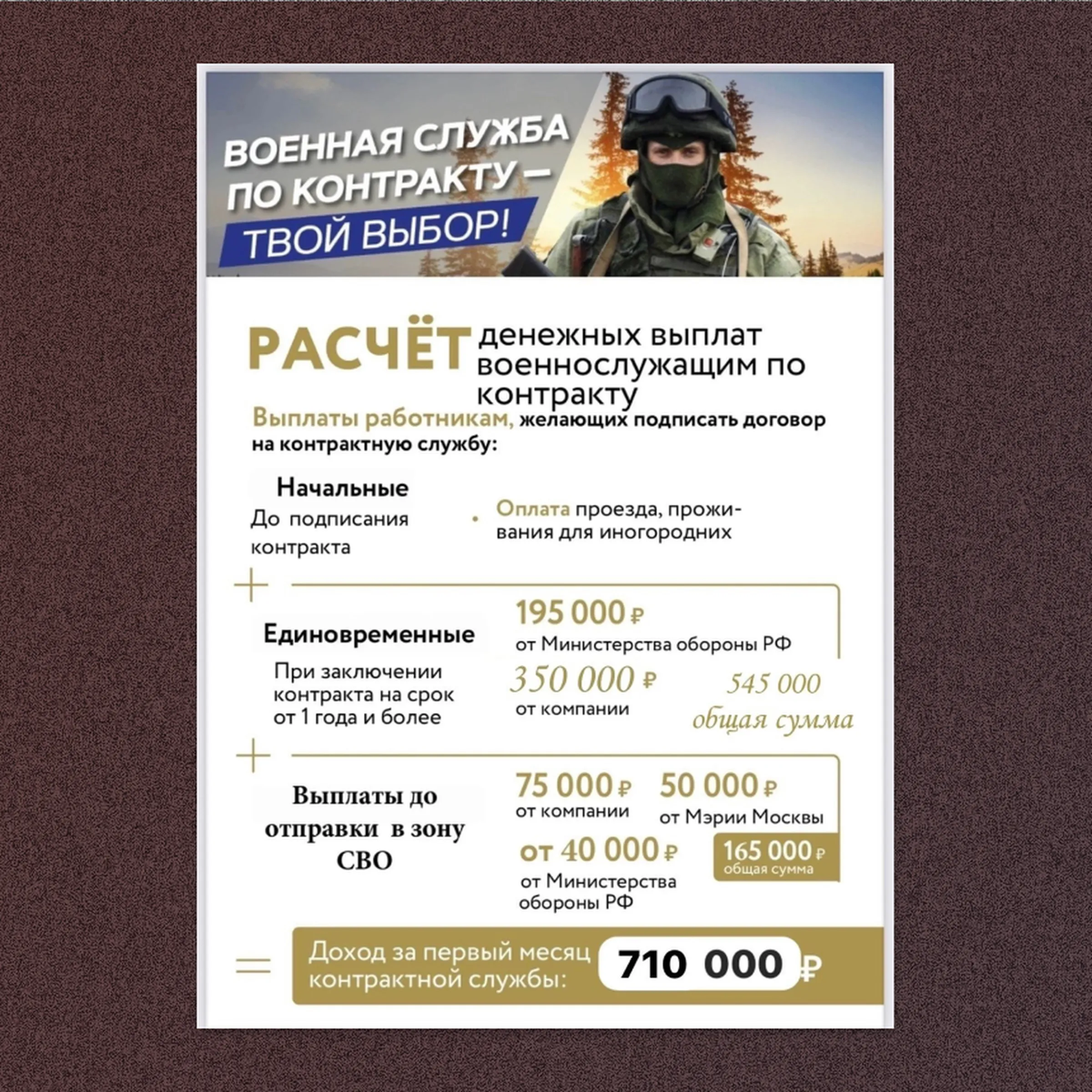
There is nothing fundamentally new in this scheme. IStories previously told how the Moscow authorities force companies to look for soldiers of fortune, fictitiously employ them and send them to the battlefront. Mosgaz, Moscow Metro, Gormost, Mosvodokanal could not refuse the mayor.
The same thing was happening at the federal level. Yevgeny Prigozhin in an interview mentioned PMCs associated with Gazprom. Battalion Uran reported that it was supported by Roscosmos. Verstka found a company that recruits volunteers for Russian Railways. All of these were state companies. As it turned out, private ones are no different from them.